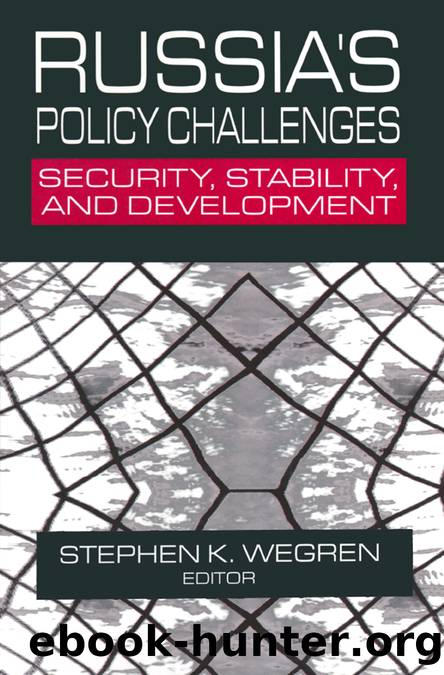Russia's Policy Challenges: Security, Stability and Development: Security, Stability and Development by Stephen K Wegren

Author:Stephen K Wegren [Wegren, Stephen K]
Language: eng
Format: epub
Tags: Technology & Engineering, Circuits, Political Science, Electronics, General
ISBN: 9781315498447
Google: 2WWlDAAAQBAJ
Goodreads: 30992869
Publisher: Routledge
Published: 2016-07-08T00:00:00+00:00
Federation Council Reform
The Federation Council (FC), or upper house of the Federal Assembly, was created by Yeltsin as part of the 1993 constitution to provide representation from the regions. At first regions elected two members (many were sitting governors), but during 1996â2001 each region was represented by the chief executive and by the chairman of the regional legislature. The constitution gave the FC an important role in the legislative process, with the right to veto legislation passed by the Duma. Since these were not full-time legislators, the members of the Federation Council depended heavily on recommendations by committees and staff. Frequently, the FC vetoed measures adopted by the Duma that would have threatened the prerogatives of the regions.
Putinâs âreformâ of the Federation Council was designed to reduce its role as an obstacle to recentralization. Its main element was to change once again the method by which members were chosen. Governors and legislative chairmen would be replaced by full-time members who were designated by governors and legislative chairmen. Much of the commentary at the time of this change assumed that the result would be a chamber made up of members who would be much more easily manipulated by Putin, in part because they would be permanently stationed in Moscow. (Indeed, it was assumed that most would be Muscovites.) It is not at all clear that the newly named representatives will be less willing to defend their regions and resist centralizing tendencies. Government officials who reported to the Federation Council in 2001, as the change in membership was gradually being phased in, argued that the new members were even more assertive in defending regional interests than were their predecessors. It is also the case that governors and regional legislatures have the right to recall their representatives without any explanation (though the speaker has suggested that a change in the law would be proposed to require clear cause).40 It is apparent that Federation Council members will be expected to use their status to lobby government officials for the interests of their regions.
More reason for speculation that the new FC would be more malleable was the formation in February 2001 of the first faction within the Federation Council, the âFederatsiiaâ group. It was led by pro-Putin members, mostly from the new contingent of deputies, and it grew to include a solid majority of deputies. Members of the faction agreed to vote in unison on important issues. Yet in January 2002, when the newly constituted Federation Council met and determined its rules, the decision was made to prohibit any factions of members, and the âFederatsiiaâ group was disbanded. Another piece of evidence of the increasing pro-presidential nature of the FC was the election in December 2001 of Sergei Mironov to the post of speaker of the FC. Mironov, a leading member of the âFederatsiiaâ group, had served as deputy speaker of the St. Petersburg city assembly before that body chose him their representative to the Federation Council in June 2001. He worked with Putin in St.
Download
This site does not store any files on its server. We only index and link to content provided by other sites. Please contact the content providers to delete copyright contents if any and email us, we'll remove relevant links or contents immediately.
Harry Potter and the Goblet Of Fire by J.K. Rowling(3046)
Never by Ken Follett(2884)
Shadow of Night by Deborah Harkness(2718)
Ogilvy on Advertising by David Ogilvy(2682)
Zero to IPO: Over $1 Trillion of Actionable Advice from the World's Most Successful Entrepreneurs by Frederic Kerrest(2397)
The Man Who Died Twice by Richard Osman(2300)
Machine Learning at Scale with H2O by Gregory Keys | David Whiting(2293)
Book of Life by Deborah Harkness(2263)
How Proust Can Change Your Life by Alain De Botton(2261)
My Brilliant Friend by Elena Ferrante(2224)
0041152001443424520 .pdf by Unknown(2220)
The Tipping Point by Malcolm Gladwell(2205)
How to Pay Zero Taxes, 2018 by Jeff A. Schnepper(2100)
Will by Will Smith(2043)
Purple Hibiscus by Chimamanda Ngozi Adichie(1982)
Hooked: A Dark, Contemporary Romance (Never After Series) by Emily McIntire(1964)
Borders by unknow(1786)
Rationality by Steven Pinker(1765)
Daughter of Smoke and Bone by Laini Taylor(1744)
